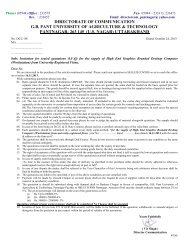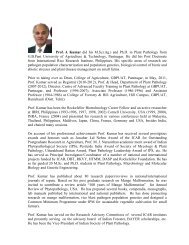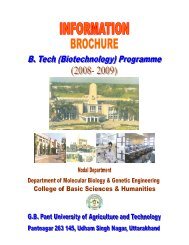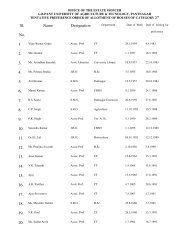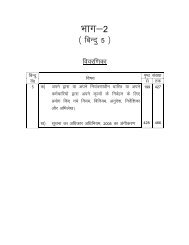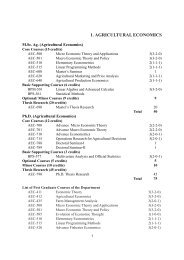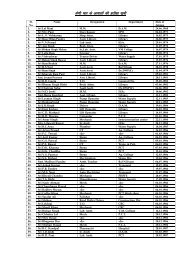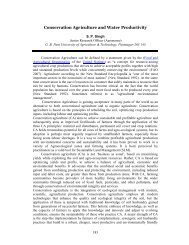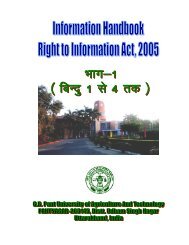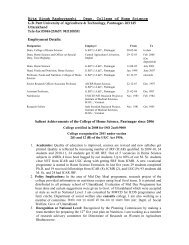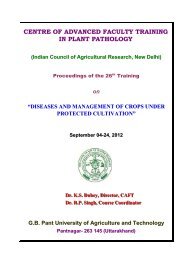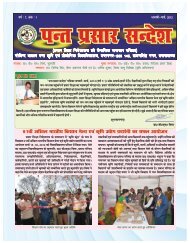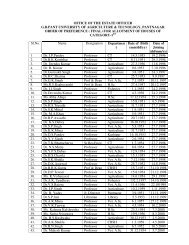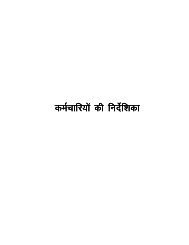Seed Health Management for Better Productivity - Govind Ballabh ...
Seed Health Management for Better Productivity - Govind Ballabh ...
Seed Health Management for Better Productivity - Govind Ballabh ...
You also want an ePaper? Increase the reach of your titles
YUMPU automatically turns print PDFs into web optimized ePapers that Google loves.
(<strong>Seed</strong> <strong>Health</strong> <strong>Management</strong> <strong>for</strong> <strong>Better</strong> <strong>Productivity</strong>)Isozyme Electrophoresis testing is a protein-based technology providing genetic purityin<strong>for</strong>mation <strong>for</strong> hybrid and inbred seed lots. Powerful and effective, it can accurately detect thepresence of unwanted plant types in hybrid and inbred seed lots.Isoelectric Focusing is a highly versatile genetic purity testing method, with the ability toevaluate proteins from many different seed and crop species. IEF technology can be used toseparate the genetics of hybrids based upon either total protein markers or various enzymeproteins. IEF testing is a very accurate, reliable method of determining the genetic purity of a seedlot. Once the variety testing procedures have been identified selfing and outcrossing can quicklyand accurately be detected.To verify trait purity of genetically modified crops, ELISA (Enzyme-Linked Immuno SorbentAssay) technology is used to detect the presence of proteins produced by specific transgenes.This technology allows to per<strong>for</strong>m: Qualitative tests <strong>for</strong> the presence or absence of protein Quantitative tests to determine the level of protein expressionDNA-based technology is the most specific and sensitive method of genetic purity testing.Using PCR (Polymerase Chain Reaction) technology, DNA detection can: Verify the presence of valuable genes Identify genetic contamination in seed lots Detect and quantify adventitious presence (AP) of biotech events in seed lots or fieldpopulations Quantify the % sterile seeds in a seed lot Measure the percent recurrent parent and homozygosity in backcross breeding programs Map qualitative and quantitative traitsDetermine zygosity of selected traitsPlant tissue culture: a mean of producing disease-free planting materialsTissue culture is now being used <strong>for</strong> the mass production of plants that are reproducedvegetatively (by cuttings), or which are difficult to grow from seed <strong>for</strong> other reasons. <strong>Seed</strong>lingsgrown by tissue culture are rather expensive, compared to those grown from cuttings. However,tissue culture has the great advantage that it can remove viruses and other pathogens, ensuringthat the seedlings are free of any disease. It is thus a good technique <strong>for</strong> producing healthyfoundation stock. Tissue culture has made possible the mass production of disease-free anduni<strong>for</strong>m plants. The technique thus brings farmers the great benefit of high-quality plantingmaterials of new high-value crops.Molecular typing <strong>for</strong> genetic purity determinationDifferent DNA markers are available, including RFLP (restriction fragment lengthpolymorphism), RAPD (random amplified polymorphic DNA) and AFLP (amplified fragment lengthpolymorphism). These markers are used to characterize a variety or line, and in this way protect- 185 -



